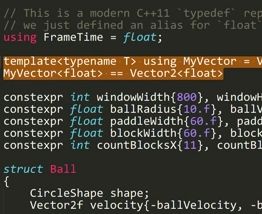Quick Q: Why have move semantics? -- StackOverflow
Quick A: Because value semantics are clean and naturally (exception-)safe, and avoid the brittleness of pre-C++11 workarounds that resort to owning raw pointers.
As often happens, the question contains the answer...
Why have move semantics?
... Can't the client already take advantage of pointers to do everything move semantics gives us? If so, then what is the purpose of move semantics?
Move semantics:
std::string f() { std::string s("some long string"); return s; }int main() { // super-fast pointer swap! std::string a = f(); return 0; }Pointers:
std::string *f() { std::string *s = new std::string("some long string"); return s; } int main() { // still super-fast pointer swap! std::string *a = f(); delete a; return 0; }

 Hello again,
Hello again,  The C++11 standard makes a distinction between acquire and release fences and acquire and release operations. The differences are important and can affect correctness as well as performance.
The C++11 standard makes a distinction between acquire and release fences and acquire and release operations. The differences are important and can affect correctness as well as performance. A new WG21 paper is available. A copy is linked below, and the paper will also appear in the next normal WG21 mailing. If you are not a committee member, please use the comments section below or the
A new WG21 paper is available. A copy is linked below, and the paper will also appear in the next normal WG21 mailing. If you are not a committee member, please use the comments section below or the  We're seeing quite a few new C++ user groups being formed, and so it's a good time to link to this timely article by Jens Weller:
We're seeing quite a few new C++ user groups being formed, and so it's a good time to link to this timely article by Jens Weller: